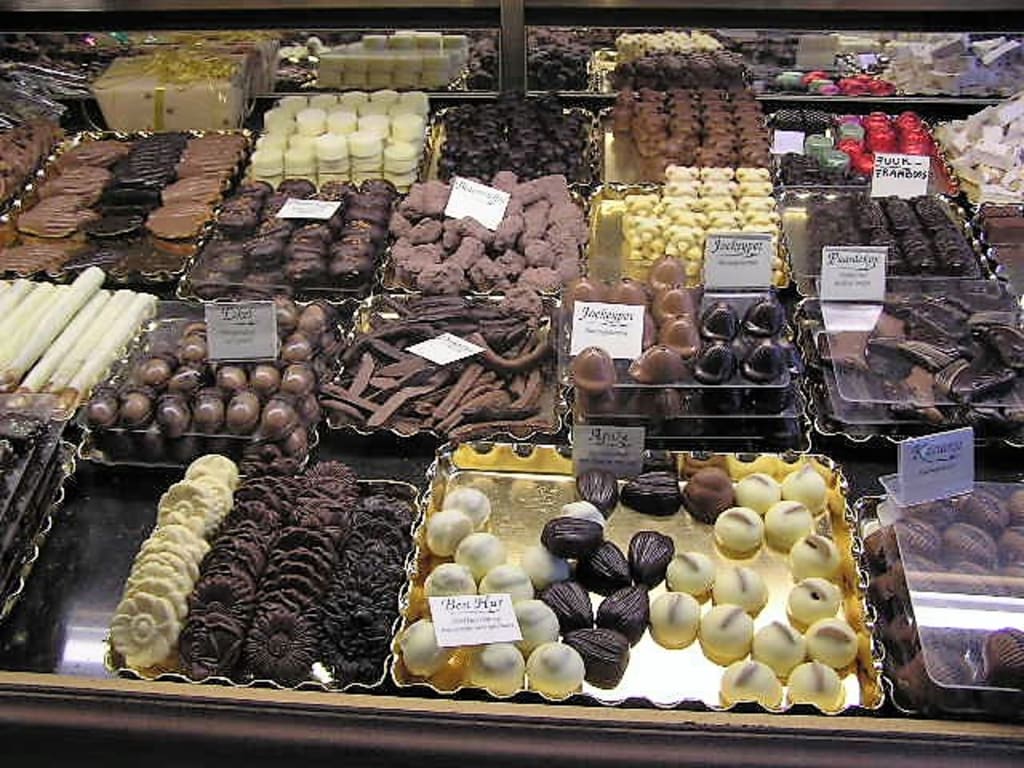
The controversy over what might properly be called "Belgian chocolate" is driven by some Belgian traditional chocolates bought from non-Belgian companies and even the export of production from Belgium. Ignace Van Dorseler, executive director of the Neuhaus chocolatier, emphasizes that in our words the Belgian word means manufacturing, headquarters, and property ... But outside the EU - a protected food situation for those remaining 100 Belgian chocolatiers with chocolate from Belgium. a mark that is difficult to protect.
Many companies make chocolate by hand, which is a tedious process and explains the dominance of small private chocolate shops, which are very popular with tourists. US chocolate shops often bring chocolate into the city to sell near US chocolate products.
The Stollwerck Chocolates Company is one of the world's most famous chocolate producers and has production plants in Belgium and Switzerland. Other popular German chocolates include La Maison du Chocolat, Tortchen, and Leonidas Chocolates. Godiva is one of the world's most famous chocolate companies, headquartered in Brussels.
To ensure the purity of chocolate and to prevent relying on poor quality oils from foreign sources, Belgian law requires at least 35% pure cocoa in production. The art of making chocolate and the pride of the world through the production process and the resulting product makes the industry adhere to traditional production methods.
This includes a ban on the use of processed oils, vegetable oils, or palm oil in all products labeled "Belgian Chocolate", a standard introduced by the Royal Belgian Association of Biscuits, Chocolate, Pralines and Confectionery (abbreviated as Choprabisco) and agreed upon. and many large chocolate producers. Products labeled “Belgian Chocolate” will be refined and modeled in Belgium.
Especially cold and frozen chocolate liqueur or pure cocoa liqueur and is only used for cooking and baking and is not intended to be eaten raw because it contains about 100% cocoa.
Any mass of chocolate from a randomly selected country will probably taste bitter, opaque, and extremely sweet. The idea that the best chocolate came from Belgium was instilled as other countries began to make their own smooth chocolate, and since the 18th century, Belgium has become the world's leading chocolate producer. An important industry since the 19th century, today it is an integral part of the country's economy and culture.
However, the country has been in contact with the product since the beginning of the 17th century, the first evidence of its use dates from 1500 BC during the Olmecs, the main Mexican civilization of that time. Central and South America were the most popular chocolate, with the largest cocoa bean crop growing from that day until today.
Then in the 16th century at the beginning of the South American and European confederacy, Spain introduced chocolate for the first time throughout Europe, the first hardened type of chocolate was introduced in Turin in the late 18th century, along with European industries. they began their production.
The 20th century laid the foundation for many of Belgium's most famous chocolate products such as Callebaut (1911), Leonidas (1913), and Mary (1919). In 1912, Jean Neuhaus Jr. (pronounced "NOI-haws") praline (pronounced "pra-lee-NUH"), the first chocolate-filled soft, created the first praline. Over the past century, the Belgian chocolate industry has made many other important contributions to the world, including the introduction of chocolate paste.
Belgium has about 2,000 chocolate companies and shops and the country is still the largest producer and exporter of chocolate. Belgium reportedly exports 400,000 tons of chocolate with an annual profit of more than four billion euros. Although Belgium may be as small and unpopular as other European countries, it is famous for its wide selection of delicacies such as Belgian beer, Liege waffles, Brussels sprouts, and Belgian chocolate.
In the 17th century, when. Belgium was still under Spanish rule, researchers imported cocoa beans from South America and introduced them to Belgian society, then widely used to prepare elaborate hot chocolate or to delight new guests. Belgian researchers first entered the chocolate market when they mixed Congo and discovered the remains of cocoa beans. Researchers have introduced these magical beans. Belgium is also immediately greeted with due interest in chocolate.
Buying hot chocolate in their Belgian chocolate factory at Frederic Blondeel in Baksteenkaai 24, Brussels: Belgian chocolate is known worldwide for its rich taste and high cocoa content.
Belgium has the world's largest chocolate factory, and Brussels Airport sells the most chocolates in the world - stores at Brussels International Airport are said to have sold more chocolate worldwide - With 220,000 tons of chocolate produced in the country it is good to think about how far chocolate goes.
If you are in Belgium and would like to learn more about the chocolate process, you should visit the MUCC (Museum of Cocoa and Chocolate), located near Grand Place, a large square in Brussels.
By the end of 2018, the cocoa industry in Belgium launched a Beyond Chocolate industry partnership that aims to make the industry 100% green by 2025, meaning that all chocolates produced or sold in Belgium must meet the appropriate certification standards or must be made with cocoa. beans for sustainability programs (company-specific). For example, cocoa beans used by Belgian chocolate brand leading Cote dOr were taken from Mondelez Cocoa Life principles.
About the Creator
Dip Rai
I am a content writer and love to Code.





Comments
There are no comments for this story
Be the first to respond and start the conversation.